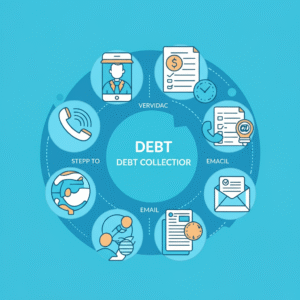
Introduction
In the fields of consumer finance and debt collection, Velocity Investments has gained notoriety, raising a number of concerns over its validity and business practices. This blog provides a thorough overview of Velocity Investments, regardless of whether you have dealt with them in a legal case or are just interested in learning more about their business practices.
We’ll go over everything you need to know to properly handle your dealings with Velocity Investments, from breaking down its business model to handling typical issues like litigation and wage garnishments. Additionally, this page provides helpful guidance about contacting the business and settling debts.

Table of Contents
- What Is Velocity Investments?
- Is Velocity Investments Legitimate?
- Signs of a Legitimate Collection Agency
- Why Am I Being Sued by Velocity Investments?
- Common Legal Issues
- Odds of Facing a Lawsuit
- Navigating a Lawsuit
- Can Velocity Investments Garnish Wages?
- Wage Garnishment Explained
- Preventing Wage Garnishment
- How to Contact and Settle With Velocity Investments
- Appropriate Channels for Communication
- Debt Validation and Negotiation Tips
- Real-World Examples and Practical Advice
- Concluding Advice and Next Steps
What Is Velocity Investments?
Velocity Investments, LLC is a debt collecting company that was founded in 2002 and has its main office in Wall Township, New Jersey. Its primary business is buying past-due consumer receivables from other lenders. It functions as a Limited Liability Company (LLC) and is a for-profit enterprise.
This implies that the original lender may sell your debt to Velocity Investments if you owe money to a financial institution or credit provider and are unable to repay it. Velocity Investments is in charge of collecting the outstanding balance after the debt has been turned over. Their business strategy is to purchase unpaid consumer debts for a small portion of the total amount owed and then collect the whole amount—or as near to it as feasible—from the debtor.

Key Facts About Velocity Investments:
- Founded in 2002.
- Operates as a third-party debt collection agency.
- Accredited by the Better Business Bureau (BBB) since 2012, holding an A+ rating.
- Licensed by NMLS (Nationwide Mortgage Licensing System & Registry).
- President and Business Manager: James Mastriani.
Their profession frequently puts them in a difficult position because debt collection procedures can make people feel overburdened or perplexed. It becomes crucial to be clear about this company’s legality and what to anticipate when working with them.
Is Velocity Investments Legitimate?
The legitimacy of businesses engaged in debt recovery is one of the most frequently asked questions regarding them. You can be confident that Velocity Investments is a reputable company. The Fair Debt Collection Practices Act (FDCPA) and other debt collection laws govern its operations.
Signs That Velocity Investments Is Legitimate:
- Accreditation: Velocity Investments is A+ accredited by the BBB, showcasing a commitment to ethical practices.
- Licensed Business: They are registered with the NMLS, which ensures compliance with regulations surrounding financial services.
- Verified Contact Channels: They utilise reliable methods of communication including emails, customer service hotlines, and physical mailing addresses.
Still Unsure? Here’s What You Can Do:
- Look them up on trustworthy platforms like the Better Business Bureau.
- Use NMLS to verify their registration using their license number.
- Request a debt validation letter directly from Velocity Investments to confirm the legitimacy of your owed amount.
Even if they are legal, some customers could view some debt collectors’ strategies as hostile. Being aware of your rights will make the interaction go more smoothly.

Why Am I Being Sued by Velocity Investments?
You are not by alone if Velocity Investments has notified you of legal action. The business has a reputation for filing litigation to recoup payments.
Common Legal Issues
When a debtor doesn’t reply or pay on a long-standing debt, Velocity Investments usually takes legal action. Their strategy frequently entails:
- Filing lawsuits in local courts to secure a judgment.
- Using the judgment to pursue methods like wage garnishment or seizing bank accounts.
What Are the Odds of Being Sued?
The likelihood of being sued increases when:
- Debt amounts are relatively high.
- Debtors ignore communication attempts.
- The statute of limitations on the debt is still active, giving the company legal grounds to sue.
If you’re served with papers by the company, do not ignore them. Non-response can lead to a default judgment, which is in their favour.
Navigating a Lawsuit With Velocity Investments
If you find yourself in their legal crosshairs:
- Read the Notice Carefully: Understand what is being claimed and ensure the debt is valid.
- Respond Promptly: File a written answer within the time frame provided.
- Consider Negotiation: Often, you can negotiate a smaller settlement amount before the court date.
- Seek Legal Counsel: If negotiations fail, having an attorney advocate for you might help reduce penalties or settle out of court.
Many courts also recognise arbitration clauses in loan agreements. These can be used to compel arbitration instead of litigation, which often favours the debtor.

Can Velocity Investments Garnish Wages?
One of the more potent legal weapons in a debt collector’s toolbox is wage garnishment. After obtaining a court judgment against you, it enables a creditor to immediately intercept a portion of your paycheck in order to collect debt payments.
When Can Velocity Investments Garnish Wages?
Velocity Investments can file for wage garnishment once:
- A court judgment has been issued in their favour.
- The employer agrees to comply with the court order.
Preventing Wage Garnishment
- Settle Debt Before the Court Date: Reach a payment agreement.
- Compel Arbitration: If arbitration is an option, it may defer or eliminate garnishment provisions.
- Oppose Garnishment in Court: You can argue exemptions based on financial hardship.
Keep in mind that many states have a cap on the amount that can be garnished, usually that of 25% of disposable income. Learn about your state’s legal system so that you are aware of your rights.
Alternative Solutions
- Filing for bankruptcy may temporarily halt garnishments.
- Submitting a formal objection citing exemptions can protect limited income earners.
Proactivity remains critical here. The longer you wait, the fewer options you’ll have.

How to Contact and Settle With Velocity Investments
By getting in touch with Velocity Investments, you may be able to settle your debt without facing additional legal consequences.
Methods to Contact Velocity Investments
- Phone Number: You can call their main line at (732) 556-9090.
- Website: Velocity Investments Website offers further resources.
- Email/Fax: Use their secure email options for sharing sensitive documentation.
How to Settle With Velocity Investments
Debt settlement is often the most cost-effective route. Here’s a simple process you can follow:
- Request a Validation Letter: Before paying anything, ensure the debt is valid. This formal letter should detail the amount owed and their ownership of the debt.
- Negotiate a Payment Plan: Reach out to their customer service to discuss lump-sum payments or instalments that align with your ability to pay.
- Obtain Written Agreements: Ensure any agreement is documented to prevent future misunderstandings.
- Monitor Credit Reports: Post-settlement, check your credit report to ensure the debt is marked as resolved.
Debt settlement agencies can support this process, though they carry associated costs. Often, you can achieve similar results on your own if you’re persistent and informed.
Real-World Examples and Practical Tips
Example 1:
A consumer faced legal action for a $7,000 loan. By engaging in negotiation, they eventually settled for a $3,500 lump sum.
Example 2:
Another individual successfully halted wage garnishment by proving their financial hardship in court. This allowed them to restructure payments.
Practical Tips for Debt Resolution
- Avoid defaults by responding promptly to notices.
- Maintain a comprehensive record of your debt communications.
- Always validate a debt’s legitimacy before making payments.

Concluding Advice and Next Steps
Although handling Velocity Investments can seem intimidating, knowing your rights and options can have a big impact on how things turn out. Being proactive will always benefit you, whether your goal is to challenge a claim, negotiate a settlement, or stop pay garnishment. Never forget to seek advice from knowledgeable financial or legal experts if you’re unsure.
Learn more about the FDCPA’s regulations and get in touch with reliable local resources for more help overcoming debt recovery obstacles.





Leave a Reply